Buffalo MiniStation Thunderbolt Review - An External with USB 3.0 and Thunderbolt
by Brian Klug on August 1, 2012 4:04 PM EST- Posted in
- Storage
- SSDs
- USB 3.0
- Thunderbolt
- Buffalo
To test the MiniStation Thunderbolt I turned to a combination of Intech’s QuickBench and the BlackMagic Disk Speed Test application from the Mac App store. I tested on my 2011 MacBook Pro, which has a first generation Light Ridge Thunderbolt controller inside. For testing on OS X, I used native HFS+ formatting for the MiniStation.
| BlackMagic Disk Speed Test - 2011 MBP | |||||||
| 500 GB HDD | 240 GB OCZ Vertex 3 | ||||||
| Read (MB/s) | Write (MB/s) | Read (MB/s) | Write (MB/s) | ||||
| USB 2.0 | - | - | 28.4 | 34.7 | |||
| Thunderbolt | 112.5 | 110.9 | 269.8 | 370.5 | |||
There’s no USB 3.0 on my 2011 MacBook Pro, so for USB 3.0 I turned to my desktop which has a Renesas based USB 3.0 controller, and reformatted the drive to NTFS. I used CrystalDisk Mark to test.
With the HDD inside, you basically get the kind of speeds you’d expect were the drive connected natively over SATA. Keep in mind, with the 1 TB HDD, speeds will actually be slightly higher thanks to the higher storage density.
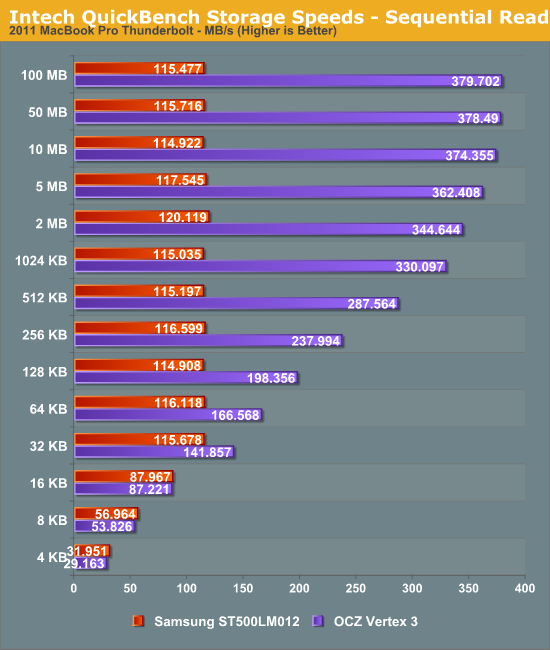
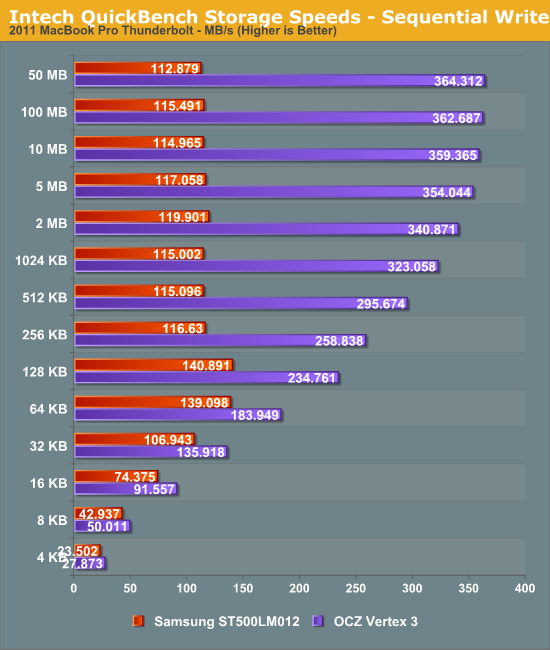
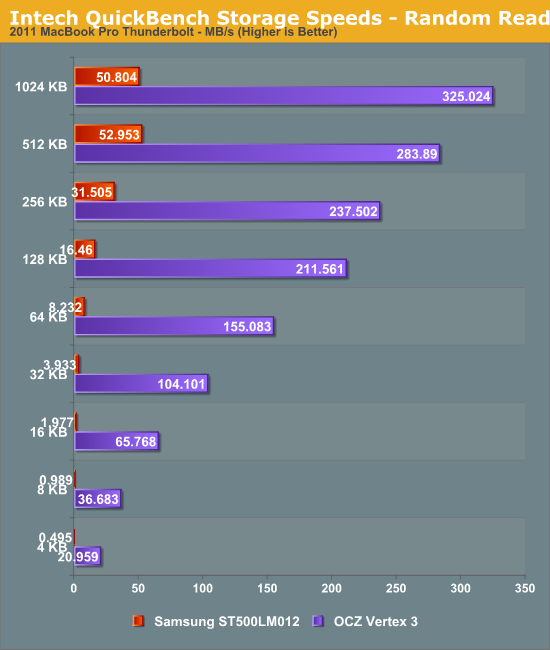
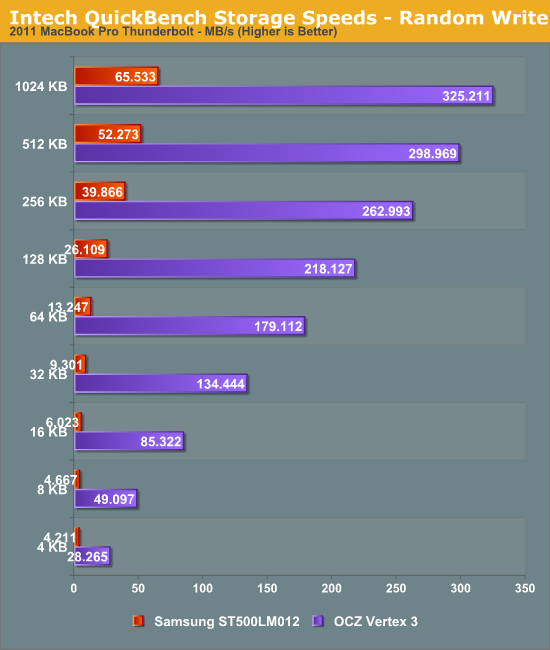
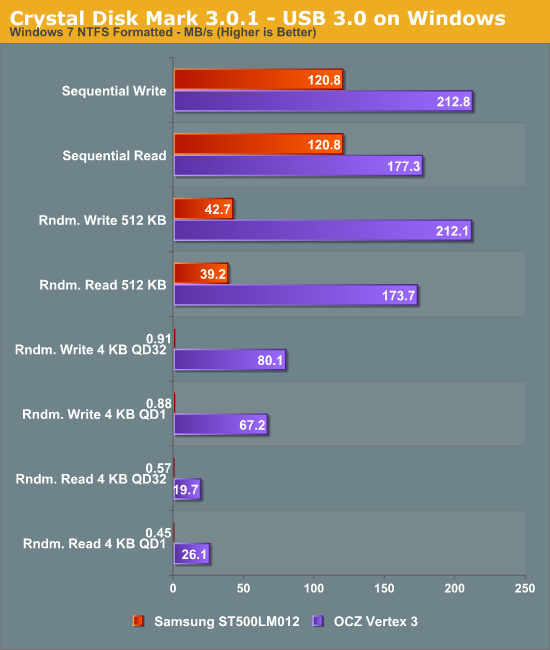
Looking at the QuickBench scores, the Vertex 3 performs just as well inside the MiniStation as it does connected to a 6Gbps SATA controller in our Bench test bed.
When connected over Thunderbolt on OS X, in System Profiler you can see the drive attached over an AHCI controller just like any internal drive, and with TRIM enabler patched kexts on OSX you can even TRIM the SSD. Buffalo has no plans to sell a bare external enclosure for people to stick their own SSD in, but at the current price point upgrading it yourself is a pretty viable option.
In addition to stressing the drive with the BlackMagic Disk Speed Test app set to 50 GB, I filled the stock HDD with random data by running good ol’ dd with data from /dev/urandom, a favorite test of mine for all storage that comes my way. Just run “dd if=/dev/urandom of=test.bin” in the root of the drive, and let it fill up. The drive’s aluminum underside does a great job conducting heat away, and gets somewhat warm (after all, it is doubling as a heatsink, and aluminum has great thermal conductivity) during use. Even with hours of constant Thunderbolt and HDD access, the drive didn’t overheat or disconnect at all with the HDD inside. I’ve also stressed the drive with the SSD inside (an unsupported configuration) and didn’t encounter any issues.
Anand noted in his original Thunderbolt piece that the cable connectors at the endpoints get warm, and measured 27.6C at the end of a cable. I ended up measuring a notably warmer temperature of over 35C during my stress testing of the drive, but my ambient temperature in AZ is also hotter than Anand’s in NC. When you consider that there’s an active component at the end of both sides of the cable (a Gennum GN2033), this isn’t altogether surprising, but it is disconcerting to feel the cables get noticeably warm during use.


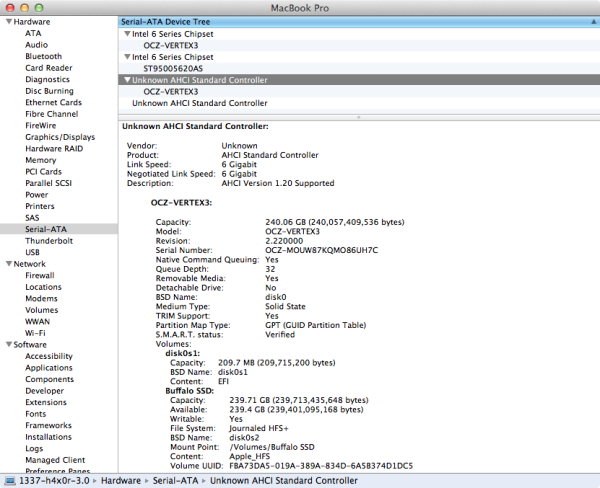
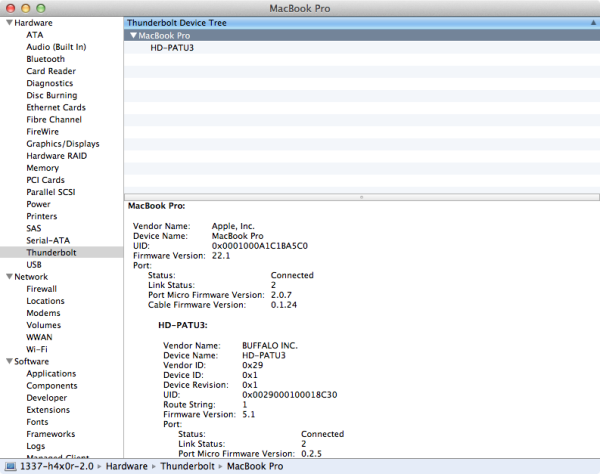








61 Comments
View All Comments
Graham. - Thursday, August 2, 2012 - link
Because USB 3.0 isn't all it's cracked up to be. It's already too slow to handle the data that a modern SATA III SSD can throw at it, let alone a multi-SSD RAID. This is where Thunderbolt really shines.AnnonymousCoward - Thursday, August 2, 2012 - link
No, sudokill has a valid question. USB3 can do up to 400MB/s throughput. The comparison did use unique SW and OS's.ssj3gohan - Thursday, August 2, 2012 - link
There is just absolutely no point to this product. It is freakishly expensive for what it does in what has become a commodity market. The design decisions that make it expensive are idiotic. Thunderbolt is a couple tens of percent faster than USB 3, but this drive doesn't even come close to saturating any interface. There is just no point.Also, it is clearly not aimed at disassembling and putting something inside that actually does benefit from the TB interface. It's cumbersome to disassemble and the device is (at least optically) internally damaged when doing so.
Who the hell thought of this and more importantly: why could Anandtech ever say it is 'an affordable price point'? Yes, it is affordable compared to a TB-carrying computer, but it's way too expensive to even consider when buying external storage (and after all, this is nothing more than external storage). It's more expensive than equally performing *wireless* hard drives! It's more expensive than buying a TB to USB 3.0 cable and any other commodity external hard drive. It's more expensive than buying a low-end NAS!
Talking about a high-margin market...
philipma1957 - Thursday, August 2, 2012 - link
Okay seagate's t-bolt adapter is 99 the cable is 50 and a usb 3 adapter is 20 so 169 gives you the ability to use 2 drives since you have a pair of adapters . so for 169 I have an endless choice of drives and the ability to use 2 of them.Of course I need to pay for drives.
this way I have a case with a slow 500gb hdd . And I have 2 ways to connect it. seems to me a lot of people would go for the seagate choice over this.
repoman27 - Thursday, August 2, 2012 - link
What driver and transfer mode was used for the USB 3.0 tests? Were you using the Windows 7 driver? The numbers would seem to indicate BOT was being used. If so, was the maximum payload size the default 64 KB? Does this device support UASP?This product really does seem to fall pretty far off of the price/performance curve. Surprisingly, there are some Thunderbolt products that aren't bad at all when you plot the cost per GB versus straight-line speed. Notably, the Western Digital My Book Thunderbolt Duo 6TB which Newegg was listing for $579.99 the other day (10.5¢/GB for 240MB/s speeds), and the Promise Pegasus R6 12TB which offers insane speeds, flexibility and good construction for less than 20 cents per GB.
This is yet another product that can only be rationalized for use with a 2011 model Mac. Every other PC with Thunderbolt also has USB 3.0, so why would you pay a premium for Thunderbolt in this case? The USB 3.0 only version of this drive is only $89.99 on Newegg right now. That's a $140 or 155% price increase for a feature that would only pay dividends on a 2011 Mac.
mattlach - Thursday, August 2, 2012 - link
I will always prefer eSATA to Thunderbolt for storage, as eSATA is native.Graham. - Thursday, August 2, 2012 - link
You don't understand. The beauty of Thunderbolt is that it is completely 'native'. Connecting a Thunderbolt drive is like connecting the drive directly to a SATA port on the motherboard. Or, in the case of a multi-bay RAID like the Pegasus it's like connecting to a hardware RAID card in to a PCIe slot. All over a single cable with no decrease in speed or added latency!mattlach - Friday, August 3, 2012 - link
Oh,That seems like it could have some neat usage scenarios then. Seems a little pricey for a simple external hard drive though, as now you'd need a separate controller in the portable unit, whereas with eSATA you are using the controller you already have on your machine.
mattlach - Friday, August 3, 2012 - link
Still think I would have prefered a further development of the Expresscard standard shrinking its size and making more PCIe lanes directly available, rather than the development of something new requiring new changes to operating systems and drivers to ensure compatibility.I wonder how long until Thunderbolt is properly supported under Linux.
Also, I have a strong distaste for proprietary formats.
munsie - Monday, August 13, 2012 - link
Even better -- since Thunderbolt looks like PCIe to the host OS, most devices just work, even under legacy OSes that were released before Thunderbolt. As long as their was already a device driver available for whatever PCIe chip is in the device, it should just work. The only thing that might not work right away is hotswap support. Since Thunderbolt devices can be plugged in and removed at any time while most machines treat PCIe as only swappable between reboots, you might have to reboot your machine if it's running an older OS.Thunderbolt and ExpressCard have more in common that you think -- both appear to the host OS as PCIe devices for the most part.
Also -- how is Thunderbolt any more proprietary than anything else? It's currently only offered by Intel, but I suspect we'll see more vendors offering chips at some point soon. Most are probably taking a wait and see approach.